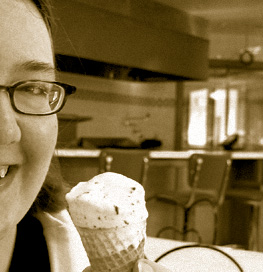i confess - i read dooce

In case you don't, Dooce posted a link to a story from a newspaper down in Florida. The article is called Girl in the Window, and it is about a severely neglected little girl (who I will refer to as D), who has since been adopted.
As you can imagine, many people were outraged at the child's
The article states that D's mother met a man 10 years her senior while attending college in Florida in 1976. They married and moved to Las Vegas and had two sons. The father of the boys died of Agent Orange in 1997, and the mother was forced to file bankruptcy. Soon after she met a man named Bob (or possibly Ron) which resulted in D. Bob/Ron didn't stick around, and probably has no idea about D.
Not long after that, their mobile home burned down. With nowhere to go, they left Las Vegas and returned to Florida. A cousin had offered a place to stay, but couldn't take the children. On the way to Florida, their luggage was lost by the bus company, but they somehow managed to find a place to live without any clothes, furniture, or even dishes.
The mother was able to find work at a grocery store. It resulted in her leaving her daughter with her oldest son, who according to at least one account was mentally retarded. The article later mentions that the mother's IQ was determined to be 77, despite that it says she also attended college and held a job as a cashier. I suppose it is possible that after the stress of losing her husband, having a baby on her own, losing her home and her belongings, being abandoned by her family, and ultimately giving up her daughter, her IQ could take a nose dive. Still it is one more mystery in this story.
The authorities were called in at least twice about D. Both times the case worker who came to the home neglected to interview the child, despite that the person who made the report claimed that D did not talk, was still in diapers, and drinking from a bottle. At one point they offered the mother free child care, but she turned it down. Despite all of this, they allowed the mother continued custody of all three of her children.
By the time the authorities acted, D was almost seven years old. She had never been to a doctor (because her mother feared they would remove her from the home). She grunted. She was still in diapers. She couldn't feed herself. She wouldn't look anyone in the eyes. She and her brothers were living in absolute filth (roaches everywhere including the freezer, dirty diapers piled four feet high). She was malnourished, anemic, and had lice. She was removed from the home and brought to the hospital where she spent six weeks being stabilized.
The courts determined that she should not be returned to her mother, who was looking at the possibility of 20 years in prison, but they weren't sure where to place her. After much debate, it was decided to send Danielle to a group home, where she lived for over a year and a half, and attended school for the first time.
I worked in a group home. In all honesty, I cannot imagine sending a child this neglected to such a setting. The article notes that she now had a bed, sheets, clothes, food, and someone to change her diaper - and that's about what you get at your average group home. It is rare that children thrive in these settings because there is too much going on. There are always kids (and staff) coming and going, so it is difficult to create structure and stability in terms of what to expect on a daily basis: Someone throws a tantrum. A fight breaks out. Another runs away. A new child is admitted while another moves on.
What this child needed most was someone to love her, so that she could finally have the opportunity to form an attachment. In a group home though, you can forget about attachment - this is frowned upon (and that isn't always a bad thing).
It was eventually decided to work on getting D adopted. Of course, you cannot put a child up for adoption who still has a mother. Thus once a family was found, a deal was made that the mother would not serve any prison time if she relinquished her maternal rights. D was part of a process called Heart Gallery, which honestly sounds like something you would do for three-legged dogs at the pound. Pictures of hard to place children are posted and potential parents are invited to come and mingle and meet them (D only had her photo on display and was not part of the meet and greet).
A family at the event saw D's photo, and were taken in by her stare. The parents always wanted a daughter. Both had grown sons from previous marriages, and a son who was a year older than D. They wanted a girl younger than their son, but one who was potty trained. Despite that D was just about everything they were not looking for, they decided to give her a chance. They felt she needed them.
D has made much progress in her new surroundings. She is out of diapers. She can swim. She knows her name. She still doesn't talk, but she is finding ways to communicate. Overall things look good, but you can't help but wonder how much better they could be if so many things hadn't gone so very wrong for so very long.
I have many issues with this story. For starters, it seems almost criminal to put so much information about D and her adoptive family and birth mother out there. Since the birth mother was interviewed for this report, and clearly regrets giving up her daughter, this could create problems for the new family. It is noted that D's adoptive family has since moved out of state, but people aren't that hard to find. Also there are people who may want to to harm D's birth mother, not to mention more than a few people who would love to study D and get published in a journal or three.
Another odd thing in the story is that the birth mother's husband and oldest son, as well as the adoptive father are all named Bernie. It is possible it is a typo because it is odd that no one makes this connection in the story. According to the narrative, D warns up rather quickly to the man who becomes her adoptive father. Is it possible because she was told he was Bernie, and she remember her brother Bernie taking care of her?
I have already mentioned the birth mother's IQ being 77, despite having been admitted to college and being employed as a cashier at an upscale grocery store. Another typo, or perhaps as I have suggested, the result of so much tragedy and hardship. It is just another thing that sticks out.
Additionally, I have problems with how the birth mother was coerced into giving up her maternal rights. Not that I believe that D should have been returned to her, but this stinks of manipulation to save embarrassment of the people who had been involved in this case. Had this gone to trial, more than likely it would have come out that the authorities had come out to investigate twice, without taking any action. The message sent to the mother was that she could continue as she was. For better or worse, she had raised two sons, who according to the story were still living with her despite that they are now almost 30-years old.
And what about her sons? While they may have been over 18 when the authorities came and removed Danielle, at least one was noted as mentally retarded. Should he not have also been removed from such filth and neglect? I can't believe he was thriving in this environment. I understand that Danielle was the reason they had been called out, but how it is okay to just look the other way and ignore this? Also do they have any right to continue contact with their half-sister (legally they don't, but what about morally)?
It is also heart breaking how little hope the system had for D. Again and again it is mentioned that the best they think will happen for her is that she be placed in a nice convalescent home. It is sad how slow the system moves to place D with a family - the goal for most agencies is to try and place a child within a year, although most fail. Every day that passed is another day that D lost to try and catch up. Why wasn't her case expedited, especially given that some of the burden of what happened to D belongs to Family Services.
The family that D has been placed with look like they have lived hard lives. If D had been a more sought after child, I have my doubts that this family would have made the cut. In the story it is mentioned that D's new brother is moved out of his room and forced to sleep in a bed squeezed into the laundry room like Harry Potter. By his own admission, he says he is afraid to sleep there and keeps a walkie-talkie handy. I know that usually adoptive family homes are often scrutinized in terms of appropriateness. I recall one case where a family was denied an infant because their home only had one bathroom, and you had to enter the master bedroom to get there. I can't believe these arrangements would have been deemed acceptable had D not been so neglected, which of course seems very counterproductive - these are the children who should be receiving the best!
Finally, it isn't discussed in the story, so it is unclear how much, if any, help this family is receiving. Raising any child can be challenging, but raising a child who has been neglected is even more complex. It isn't clear if anyone is monitoring the family and D's progress. And now that they have left the state of Florida, they will have another system to learn and negotiate.
I think that this story shows that we need to do more for the children out there who have no one to protect them. We also need to stop being so judgmental, and instead reach out and show compassion. While this is an extreme case, there are many children (and parents) out there suffering. Sometimes small gestures go a long way. Offering to babysit or prepare a meal or even just listening can make a difference to a family going through a difficult time.
on the night stand :: Moose
Labels: child abuse, dooce, feral child, girl in the window, shades of gray






2 Comments:
This says everything I wanted to say about this story.
@kibblesbits
Thank you for that. I know you get it.
Post a Comment
<< Home